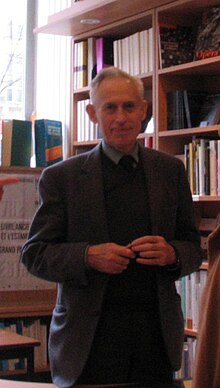Richard Swinburne
| Richard Swinburne | |
|---|---|
 |
|
| Born |
26 December 1934 Smethwick, Staffordshire, England |
| Alma mater | Exeter College, Oxford |
| Era | 20th-century philosophy |
| Region | Western Philosophy |
| School | Analytic philosophy |
|
Main interests
|
Philosophy of religion, philosophy of science, theology |
|
Influences
|
|
|
Influenced
|
|
Richard G. Swinburne (/ˈswɪnbərn/; born 26 December 1934) is a British philosopher. He is an Emeritus Professor of Philosophy at the University of Oxford. Over the last 50 years Swinburne has been an influential proponent of philosophical arguments for the existence of God. His philosophical contributions are primarily in the philosophy of religion and philosophy of science. He aroused much discussion with his early work in the philosophy of religion, a trilogy of books consisting of The Coherence of Theism, The Existence of God, and Faith and Reason.
Swinburne received an Open Scholarship to study classics at Exeter College, Oxford, but in fact graduated with a first class BA in philosophy, politics, and economics. Swinburne has held various professorships through his career in academia. From 1972 to 1985 he taught at Keele University. During part of this time, he gave the Gifford lectures at Aberdeen from 1982 to 1984, resulting in the book The Evolution of the Soul. From 1985 until his retirement in 2002 he was Nolloth Professor of the Philosophy of the Christian Religion at the University of Oxford (his successor in this chair is Brian Leftow). He has continued to publish regularly since his retirement.
Swinburne has been an active author throughout his career, producing a major book every two to three years. He has played an important role in recent debate over the mind-body problem, defending a substance dualism that recalls the work of Rene Descartes in important respects. See The Evolution of the Soul, 1997.
...
Wikipedia
